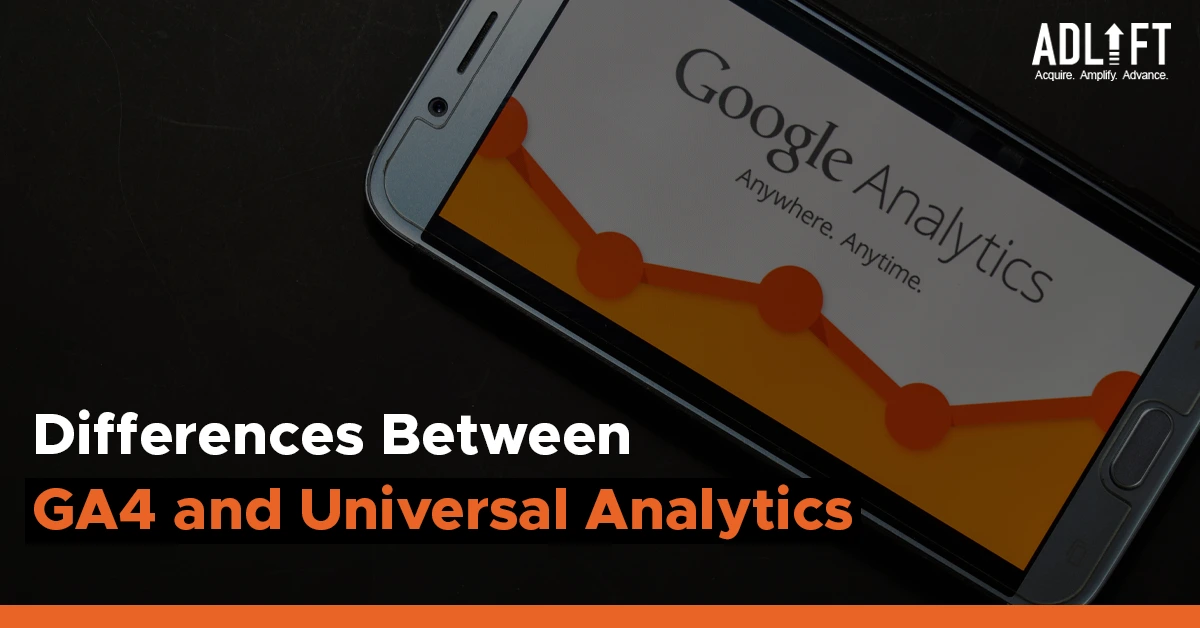10 Key Differences between GA4 vs Universal Analytics

Google Analytics 4 (GA4) and Universal Analytics are two different versions of Google’s analytics platform. Each GA4 vs Universal Analytics have its own collection of features and functionalities.
Here are the key differences between GA4 and UA that highlight the advancements and improvements in GA4’s data tracking and analysis capabilities, making it an appealing choice for businesses looking to stay at the forefront of analytics technology.
By understanding these distinctions, businesses can make informed decisions about which version to adopt based on their specific needs and goals. By effectively harnessing the power of Google Analytics 4 differences to drive data-driven insights and success.
Data Collection Method
The main difference between Google Analytics 4 and Universal Analytics lies in their data models. GA4 utilises an event-based data model, which means it focuses on tracking user interactions through events triggered by actions such as clicks, video plays, and form submissions.
In contrast, Universal Analytics primarily relies on pageviews for data tracking. This event-based approach in GA4 allows for more granular data collection capabilities, providing deeper insights into user behaviour.
User-Centric Approach
Google Analytics 4 (GA4) takes a user-centric approach to data tracking and analysis, emphasising individual user journeys across devices and platforms. This user-centric approach is one of the significant GA4 UA differences, which primarily focuses on session-based data and page-level insights.
By prioritising the understanding of user behaviour at a granular level, GA4 provides businesses with deeper insights into user interactions and enables more effective optimization strategies.
Enhanced Cross-Device Tracking
GA4 offers improved cross-device tracking by utilising Google Signals, which is a significant difference between GA4 and Universal Analytics. This feature allows marketers to gather data from users who have opted in across multiple devices.
Machine Learning Capabilities
GA4 incorporates advanced machine learning techniques, which is a significant difference between Google Analytics 4 and Universal Analytics. These techniques enable GA4 to offer features like automatic insights and predictive analytics, helping marketers identify trends, anomalies, and offering actionable guidance for optimising marketing strategies.
Streamlined Configuration and Setup
GA4 simplifies the configuration and setup process compared to Universal Analytics. It offers an intuitive user interface and streamlined tracking code implementation, making it easier for users to get started. The main difference between Google Analytics 4 and Universal Analytics is the underlying data model and measurement approach.
App Tracking Emphasis
While Universal Analytics primarily focuses on website tracking, GA4 places more emphasis on app tracking. GA4 provides enhanced app analytics capabilities, allowing businesses to gain more profound insights into user behaviour and engagement within their mobile applications.
The main difference between GA4 and Universal Analytics lies in their tracking capabilities, with GA4 being more suited for app analytics while Universal Analytics is tailored for website tracking.
Data Retention Policy
GA4 introduces changes to the data retention policy compared to Universal Analytics. By default, GA4 retains data for a period of 14 months, with the option to adjust the retention period as needed.
Additionally, one of the key differences between GA4 and UA is the inclusion of advanced analysis features and machine learning capabilities in GA4 that are not available in UA.
Integration with Google Ads
GA4 offers tighter integration with Google Ads, enabling improved attribution modelling and remarketing capabilities. This integration allows marketers to analyse and optimise their advertising campaigns more effectively.
Furthermore, one of the notable Google Analytics 4 differences is its enhanced cross-platform tracking, which provides a unified view of user interactions across multiple devices and platforms.
Reporting and Analysis Features
GA4 introduces new reporting and analysis features, such as the Exploration feature, which allows users to perform ad-hoc analysis and custom segmentation without having to rely heavily on preconfigured reports.
Moreover, when comparing GA4 vs Universal Analytics, another significant aspect of the GA4 UA differences is the redesigned user interface and improved user experience, making it easier for marketers and analysts to navigate and access the desired data and insights.
Transition Challenges
Migrating from Universal Analytics to GA4 may pose challenges, especially when it comes to historical data migration, tracking code adjustments, and adapting to the new reporting interface. It is necessary to prepare and manage the transition carefully to ensure a smooth switch to GA4.
Ending Note
These key differences between GA4 and Universal Analytics highlight the evolution of Google’s analytics platform, offering more advanced tracking capabilities, improved cross-device insights, and a user-centric approach to data analysis.
Understanding these distinctions, including the difference between GA4 and Universal Analytics, is crucial for businesses looking to make informed decisions about their analytics strategy and leverage the full potential of GA4.

